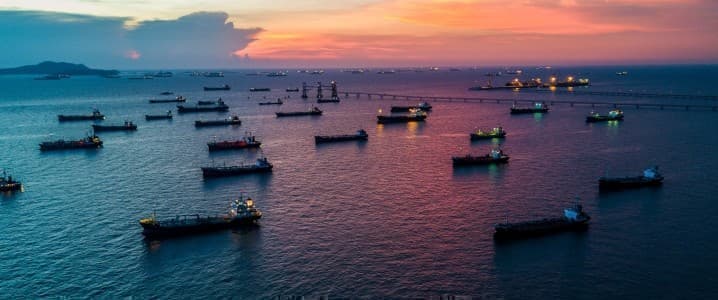The number of container ships transiting through the Red Sea towards the Suez Canal tumbled 90 per cent year-on-year through the first week of January, as attacks from Yemeni Houthi rebels continue to disrupt one of the world’s busiest trade routes.
New figures from industry tracker Clarksons Research showed the collapse in traffic into the Gulf of Aden, which is used as an entry point for container ships travelling between the Suez Canal.
Key shipping giants such as Maersk, MSC and Hapag-Lloyd have restricted traffic through the region since attacks from Iran-backed Houth rebels began in mid-November, sparking fears over the impact on global supply chains and inflation. The Red Sea is a vital shipping route, connecting the Indian Ocean to the Mediterranean via the Suez Canal.
Maersk resumed crossings between December 25 and 2 January under a US-led naval coalition. But Hapag-Lloyd has warned it plans to continue diverting traffic away from the Suez Canal, despite the international military operation to keep the area safe.
Clarksons said total daily journeys through the Suez Canal, including bulkers, tankers and LNG carriers, had fallen 46 percent on the first week of January, when compared with December.
The data also revealed some 364 containerships had opted to journey around South Africa’s Cape of Good Hope since security fears heightened in November, with that total more than double the 155 reported on December 21st.
Re-routing through the African continent and the Cape of Good Hope could add 10 to 14 days to a voyage, according to shipping consultancy Sea Intelligence.
The long diversions away from the Suez Canal are causing a surge in shipping costs, which has an affect on the entire goods supply chain, all the way to checkout. It has also impacted oil prices, which spiked in January as Iran rejected calls to end its support for the Houthi attacks.
Clarksons said the Shanghai Containerised Freight Index (SCFI), the most widely used measure of freight cost, had risen 88 percent from early December to the highest level outside of those seen during Covid-19, when rates went haywire.
Costs on the SCFI Shanghai to Northern Europe route stood at $2,871 on 5 Jan, more than treble the early December level.
Matthew Gore, logistics expert and partner at Holman Fenwick Wilman, said: “The container shipping sector has had a tricky start to the year,” with added journey times seeing carriers “impose surcharges to cover the additional costs.”
“Some market capacity has been soaked up by these situations and freight rates have risen, with the repercussions likely to be felt for months to come.”
By City AM
More Top Reads From Oilprice.com:
- Azerbaijan Doubles Down on Its Domestic Oil Potential
- China Looks To Play Peacemaker in the Middle East
- U.S., UK Shoot Down 21 Drones in Red Sea



















Dr Mamdouh G Salameh
International Oil Economist
Global Energy Expert